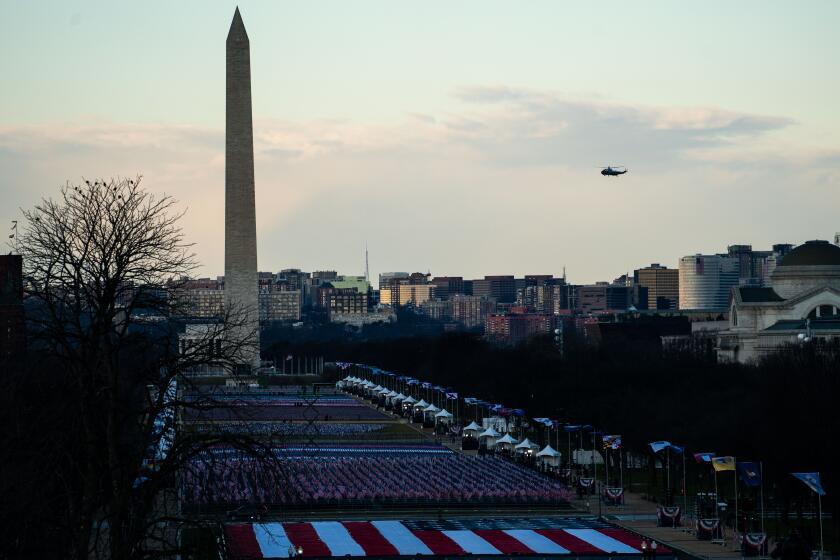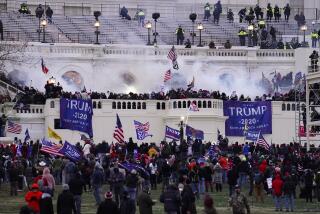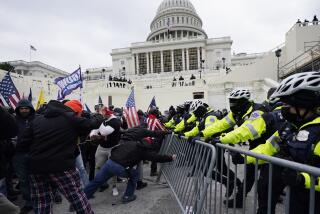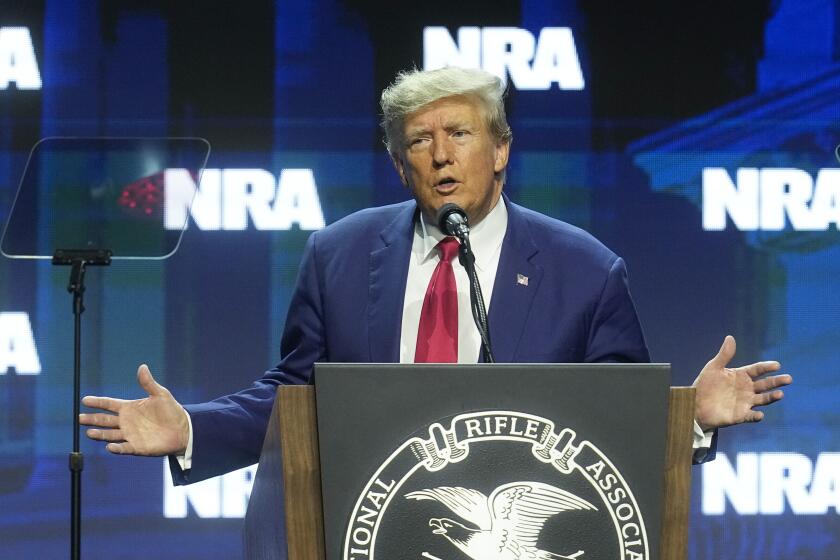Op-Ed: Why the Capitol riot could speed up D.C.’s path to statehood
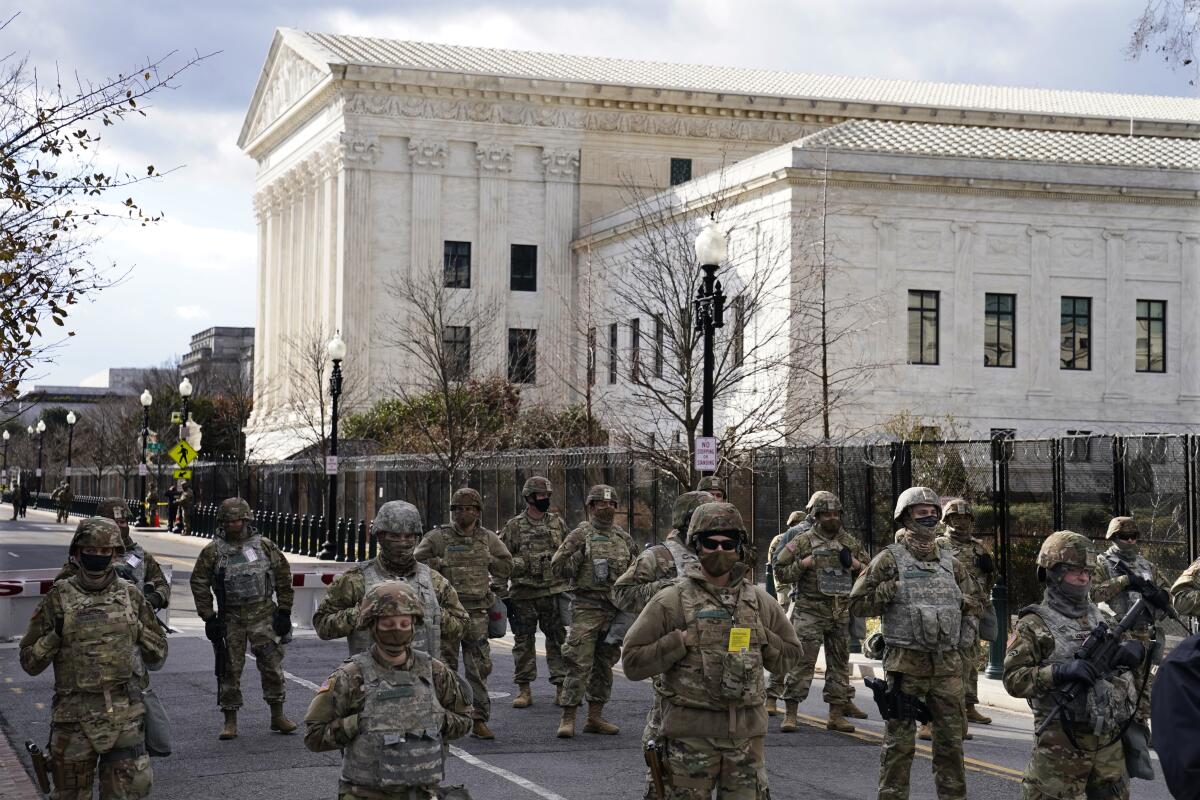
The horrific assault by Trump supporters on our nation’s capital will have at least one unintended consequence: It provides additional impetus for Congress to grant statehood to the District of Columbia.
When Muriel Bowser, mayor of Washington, D.C., was asked the day after the Capitol attack how she might have responded differently if she had been governor of D.C., she said: “We would not make a request to the secretary of the Army for guards support.” That’s because, as a governor, she would be free to deploy the D.C. National Guard as she saw fit.
For the record:
4:35 p.m. Jan. 26, 2021An earlier version said Washington, D.C., is denied presidential electors. The district was granted electors in 1961.
There is an important difference between being sovereign and being a supplicant — especially during the exigencies of a crisis. Ahead of the Capitol assault, the Pentagon had tightly limited the mayor’s use of the D.C. National Guard, prohibiting the guardsmen from receiving ammunition and riot gear or interacting with protesters “unless necessary for self-defense.” More than 25,000 National Guards were deployed to Washington for Wednesday’s inauguration of President Joseph R. Biden.
One well-known argument for D.C. statehood has been enshrined on District of Columbia license plates since 2000 — “taxation without representation.”
District residents must pay federal income tax but cannot elect voting members to Congress. Bowser is right to be “upset that 706,000 residents of the District of Columbia did not have a single vote” when Congress resumed certifying the results of the presidential election “despite the fact that our people were putting their lives on the line to protect our democracy.”
Washington, D.C., was prepared for the worst ahead of Inauguration Day. But the worst stayed home.
The violent attack that the world has just witnessed underscores an additional rational for granting the district statehood. Under our constitutional system, an essential and inviolable right of states is “police power,” which gives states the right to enforce order within their territories.
In 2000, in United States vs. Morrison, Chief Justice William Rehnquist wrote for a majority of the Supreme Court in striking down a federal remedy for gender-motivated violence: “We can think of no better example of the police power, which the Founders denied the National Government and reposed in the States, than the suppression of violent crime.”
The right of people to have their local government maintain public order is undermined when the mayor has to go hat in hand to the secretary of the Army asking for help.
Making the District of Columbia a sovereign state would still allow federal authorities to maintain their independent right to protect the Capitol grounds and other federal property. But statehood would also give residents the right — which citizens of all other states have — to elect representatives with full power to maintain public order.
During the Georgia runoffs, Republican candidates used the threat of D.C. statehood to motivate conservative turnout. If Democrats gained control of the Senate, their argument went, they would be able to entrench themselves for years to come by adding reliably liberal seats to Congress. As the overly dramatic Tucker Carlson put it on Fox News: “The point is two more Democrats in the United States Senate, probably four if you include Puerto Rico. That’s a permanent new majority. That means you have what’s called a one-party state, and that means the game is over.”
Under the Constitution, the House and the Senate have the power to approve statehood by simple majorities. And President-elect Biden has already indicated that he would sign a D.C. statehood bill. The biggest obstacle to statehood now that Democrats control both houses and the presidency are the rules requiring the votes of 60 senators to cut off debate. But these Senate rules can be, and have been, amended in recent years to require just 50 votes. So at the moment it appears Republicans can do little to stop the D.C. movement for statehood.
A recently published and diabolically inventive piece in the Harvard Law Review on election and voting law suggested that a Democratic majority in Congress could exploit the relative ease of creating states from federal lands. It floated a radical idea: Congress could turn the District of Columbia into 127 states. This “pack the union” proposal’s goal was to temporarily create enough additional states to amend the Constitution to replace “the electoral college with a popular vote.”
One small advantage statehood would bring is that it would preempt some future Congress from cutting up the district’s federal land into dozens of states. Approving a single additional state modestly moves our electoral college toward more popular representative government, but takes off the table this more radical, sudden elimination of the electoral college.
Certainly, the rioters did not set out to help the District of Columbia gain statehood. Many may believe in states’ rights, just not for the overwhelmingly Democratic district and its residents, many of whom are Black. But the violent unlawfulness of the mob has provided Congress with vivid additional justification for action. A fitting, poetic irony will follow if their seditious antidemocratic acts help move our union toward a more representative democracy.
Ian Ayres teaches law at Yale University and is co-author of “Weapon of Choice: Fighting Gun Violence While Respecting Gun Rights.”
More to Read
A cure for the common opinion
Get thought-provoking perspectives with our weekly newsletter.
You may occasionally receive promotional content from the Los Angeles Times.
